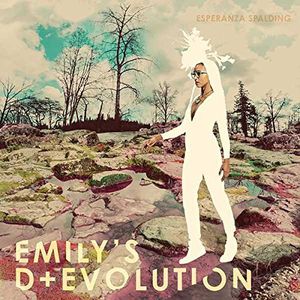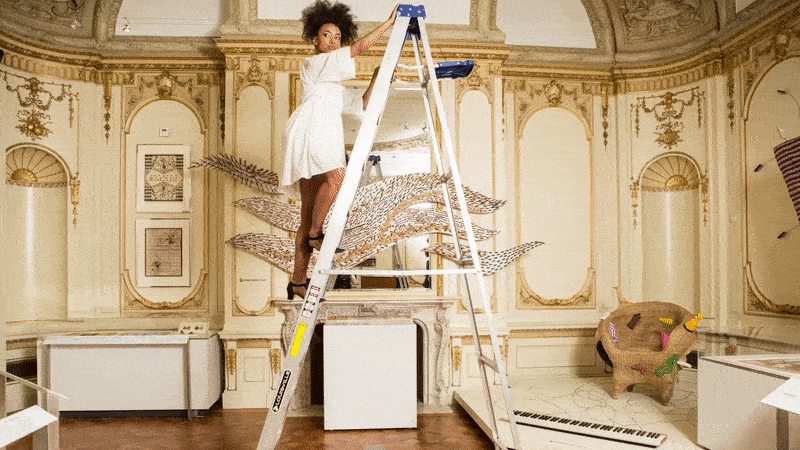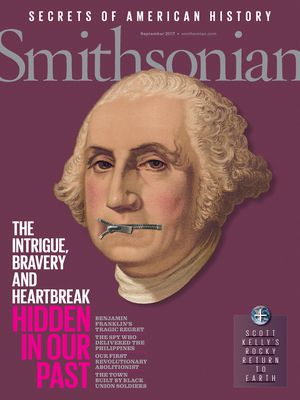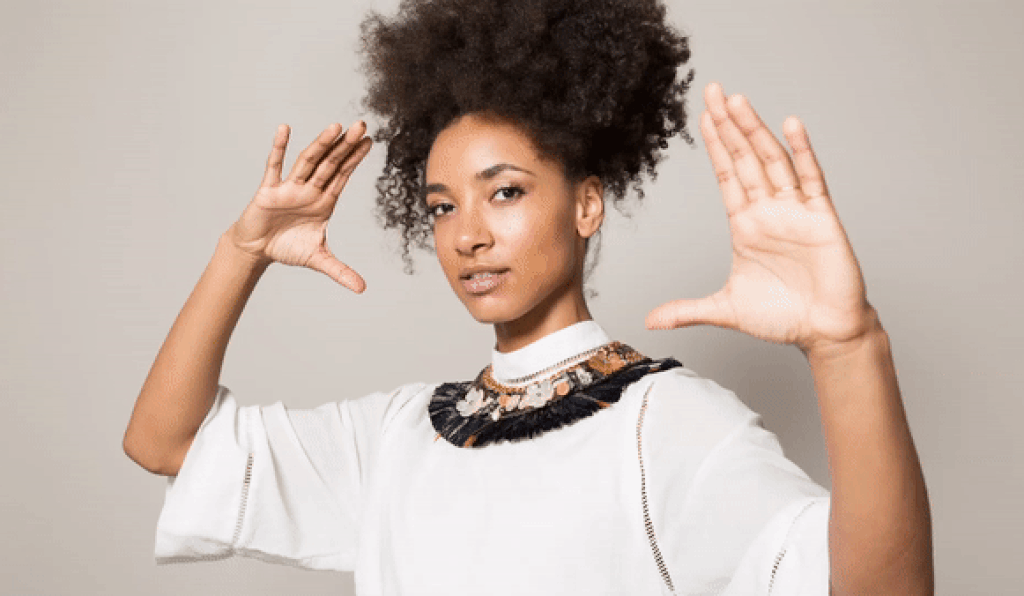Grammy Award-winning musician Esperanza Spalding puts her spin on the history of design at Smithsonian’s Cooper Hewitt museum in a show about transformation, the motif of her latest album, ‘Emily’s D+Evolution.’ Smithsonian magazine spoke with her about her new gig, her pop culture loves, and her thoughts on social media
Tell me about your guest-curated exhibition. How did you go about selecting and organizing objects?
I wanted to present objects through the lens of D+evolution. So in conversation with the curators on the team that they selected for me, we found themes that we knew we would be able to find in the histories of objects that express d+Evolution, this process of one structure, aesthetic, value system, methodology devolving, coming undone as it makes way for the next iteration, as it evolves. They’re from all over the place. Sometimes we’re focusing on more of a cultural d+evolution as reflected through the artist’s choices and the design. Sometimes we’re talking about manufacturing d+evolution. For example, we deconstructed pianos. We completely tore them apart and reconstructed them into some functional objects in the exhibitions like staircases.
How did your musician’s background inform your curating of the exhibition? Are the two art forms similar?
I don’t know if it helps or hurts because I never curated an exhibition before I was a musician. I have no idea.
Tell me about the music in the exhibition.
In the exhibition there is a section that features the designs on the covers of sheet music that was popular in the first half of the 20th century. I took one of the songs from the exhibition, it’s called “Love Songs of the Nile,” and I worked with [musician and composer] Leonardo Genovese to record a direct rendering of the sheet music, perhaps what it would have sounded like to the first person who bought it and played it. And then we deconstructed that version of the sheet music into improvisational performance. And then I did another deconstruction of that by performing a vocal interpretation of what we improvised. And then Leonardo took the sound files of all three of those versions and he cut them up and he reassembled them and evolved the original composition from the sheet music into this whole new synthesized arrangement. It’s original but it’s all d+evolutions of a piece of music from my exhibition.
Do you have a single favorite object in the exhibition?
No, I don’t think I have a favorite. But right now when I come into the room and step back and absorb what’s in there, the object that is most intriguing to me is a textile designed by Jack Lenor Larsen and Eliza Wilcox. The pattern was made by 50 Kenyan women tying the cloth in sync to the rhythm of the drum. When you look at it, it’s perfectly spaced vertical lines and they’re so perfect and evenly spaced because the women were all tying in sync to the same groove. I think that’s such an amazing and innovative manufacturing technique. I wish I could see that method in action.
What music are you listening to right now?
I’ve been listening a lot to this Chick Corea album called “The Vigil.”
Oh! Also.
So, I ran into a great musician, who’s my neighbor now, Craig Taborn, and he told me that David Holland was in a band with Chick Corea. Right after they left Miles Davis’ band, they formed a band called ARC. So I ordered it on vinyl because I’m listening to more vinyl these days. That’s been on rotation a lot in my house. The cover’s so beautiful. It’s this road that just goes into infinity on the horizon
Do you prefer to listen to music on vinyl?
No, I just like that it keeps me focused on what I’m listening to. You have to get up and turn it over. It feels like I stay more engaged in the action of listening. It’s easy to put music on in the background and take it for granted. So when cooking or sometimes I just sit and listen to a record. It’s easier to take time for dedicated listening when it’s on vinyl. There’s no illuminated screen to interface with, it’s just very direct interface with the sound and I love it.
What are you reading right now?
I’ve been revisiting a book that I’ve actually read many times but it’s a great companion for anyone involved in the creative pursuit. It’s called Indirections: For Those who Want to Write and the author’s name is Sidney Cox. It’s such a phenomenal handbook for us creatives.
And then I just read this book about drugs during the Third Reich called Blitzed. It’s kind of depressing.
And my little brother, who’s this brilliant engineer, sent me a book that’s called Drawdown, which is inspiring. That’s the light in the life right now! That is about projects that are being implemented around the world to draw carbon out of the atmosphere. And not only reducing our carbon footprint but actually resequestering is what it’s called I think, carbon that has been emitted to the atmosphere I’m really passionate about developing a sustainable lifestyle. Particularly for someone like me, who travels all the time, it’s hard to figure out how to keep your carbon footprint down. So one of my missions in this life is to develop truly sustainable lifestyle.
What have you implemented in your life or changed about you life to make it more sustainable?
Just little things. I eat less meat. I take the train as much as possible and bike a lot. I avoid getting paper cups when I go get my coffee. I compost, go to the farmer’s market, eat local as much as I can. It’s not enough though. One of my goals is to develop a sustainable homestead within the city limits. That’s my next big mission.
Do you ever listen to podcasts?
No, not really. I’ve only listened to one once in my life. I’m more of a radio listener when I’m in the car in Oregon, electric car I should add. My brother and sister both have electric cars so when I’m home, I borrow them and listen to KBOO. Woo! Shout-out to our local independent radio station. And obviously NPR. It’s so cliché. Cliché liberal.
What are some of your favorite films?
My favorite favorite favorite film of the last year was the “Great Beauty.” I really liked that. It’s like floating in body temperature salt water. I love it. I love it. I love it. I‘ve watched it three times and I would have watched it more, but I don’t need to because I can see it. I can feel it. I experience that film really viscerally.
I don’t really know what the director put in there, but it’s something that just activated my nervous system and the part of my brain that allow images to recreate themselves in my mind’s eye. I’m watching that movie all the time. I can see it right now. I love that movie. I love the music in that movie. I love the characters. I think it’s so perfect.
I really loved “Anna Karenina,” the Joe Wright film. It feels improvisational the way that he edits it and the way that we move around the characters. I just think it’s so brilliant and of course I love the feeling of it being a theater piece.

Emily’s D+Evolution
Esperanza Spalding presents her latest project Emily’s D+Evolution a rekindling of her childhood interest in theater, poetry and movement, which delves into a broader concept of performance.
I’m sure you’re pretty busy, but do you ever get around to watching TV?
No. No I don’t. I don’t have a TV.
Why is that?
I don’t know. I’ve never owned a TV myself. There was one at my parents’ house.
That’s probably for the best.
Yeah I never come and think I want to watch TV. I don’t know. It doesn’t do much for me.
So when you do come home from a long day, what would you do to entertain or wind down?
I would make some sort of apple cider vinegar/red wine cocktail. It sounds gross but I love it. I like sour things. It’s a lot of acidity. I would make that and then I would probably read. Or my friends are always sending me interesting YouTube videos of documentaries or performances. I’d probably watch those.
I read a lot and I really enjoy listening to poetry so I might put on some Sylvia Plath or W.H. Auden or MF DOOM, one of my favorite poets.
I don’t have a lot of downtime. And when I do, I’m usually with friends because they travel as much as I do. You have to really make a big effort when you’re home to see the people you love. Usually I’m having dinner with somebody or lunch with somebody when I get quote unquote home.
Where do you consider home at this point?
I consider Oregon home. It is my home technically, literally. But New York is my second home. It’s my second landing pad. I end up being here a lot for work. A lot of musicians, artists, family friends are based out here. This feels like a second home for sure.
You were at the Peace Ball this year in Washington. What was a highlight of that for you?
Speaking with Angela Davis and Yuka Honda and Azar Nafisi, who wrote Reading Lolita in Tehran. It was really magical sitting up there talking with them. In a way I feel like the whole thing was just an excuse to get to work with Annie-B who is someone who I admire. She’s a director and she co-founded the theater company, Big Dance Theater. She came in and choreographed the performance of the song we did.

I know you have social media accounts. I saw your Instagram story yesterday. Do you use social media a lot? If so, do you follow anyone inspiring?
It’s kind of embarrassing because I know it’s not that hard. I’m not a person who takes photos when I travel. I think that may be the indicator if you’re going to be good at social media or not. I don’t feel particularly compelled to just show random pictures of what I’m doing. I feel like I want to disseminate beauty.
I respond to the pressure that you have to have a social media presence, but I don’t feel very proud or inspired by it. I try to spend my time away from my phone to do my job, which is making things for people to experience live. Partially, I’m a little torn about the thought of encouraging people to look at their phones for the sake of something I put up there. I’d rather encourage everyone I know and love and don’t know to go outside and take a walk or have a conversation or read a book or listen to music. I don’t know if these phones are enhancing our compassion, or creativity or expression. Or maybe they are! I don’t know.
I like that. I think I look at a lot of things that aren’t worth looking at on social media.
Don’t we all?
So what is next? You’re done with this exhibition; it’s on view now. Are you working on any new music?
I’m actually leaving Monday to go write for a couple of weeks to complete the first draft of a libretto that I’ve been working on that’s due at the end of August, set to premiere in 2019 with Opera Philadelphia. Wayne Shorter’s writing the music and we don’t know who the director is yet but it will be wonderful. That’s the big thing on the horizon.
And then in the fall, beginning at 9 a.m. (PT) on September 12, I’m hoping to create an album in a way that’s an improvisational process. So it’s going to be streamed live on Facebook and it’s 77 hours. The camera’s on the whole time and we all walk into the space with no preconceived notions. We just come in and start creating and allow that immediacy and urgency that is possible when you start something. I’d like to have an experience and share the experience of doing one thing without any agenda. Purely an exposition of creativity and imagination.
And we have to finish it in three days. And there will be a limited edition of the cd. You get it or you don’t and that’s it. It’s like a project of improvisation applied to making and disseminating a record.
It could be a total disaster, full disclosure. But even the most well-prepped, revised album can be a disaster too. So, I just figure everywhere else in our lives, there’s a lot of structure and planning and intention and motive and desired results and that’ll be most of my life, most of our lives.

Subscribe to Smithsonian magazine now for just $12
This article is a selection from the September issue of Smithsonian magazine





